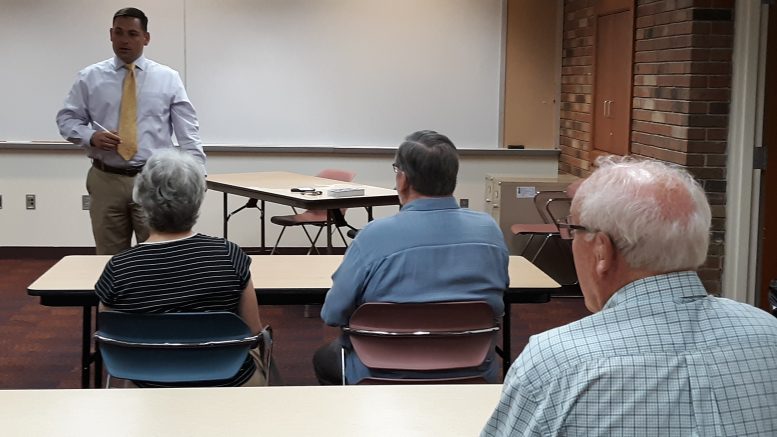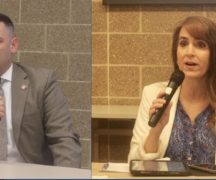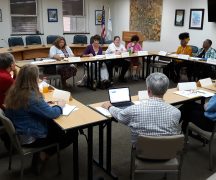By JAN LARSON McLAUGHLIN
BG Independent News
Ohio needs to take actions to prevent gun violence and to save Lake Erie, according to Bowling Green area citizens who brought their concerns to State Rep. Haraz Ghanbari, R-Perrysburg, at the Wood County District Public Library.
Ghanbari is holding “Huddle with Haraz” events throughout the county at public libraries, to hear from his constituents.
He got an earful from the seven Bowling Green area citizens who showed up last month.
Retired English teacher Peg Baker asked Ghanbari why Ohio doesn’t ban assault-type weapons and require stiffer background checks.
“The state of Ohio can ban assault weapons,” she said.
“Those are not used for any purpose but to kill people as quickly as possible,” Baker said, citing that the U.S. has 4 percent of the world’s population but 42 percent of the world’s guns.
Ghanbari acknowledged that any regulations of firearms is an “explosive issue.” The new state representative said he favors data-informed decisions, “instead of decisions made off of emotion.”
“There’s a lot of violence that doesn’t pertain to weapons, and it still happens,” he said.
“A gun can be used for good reasons and bad reasons,” Ghanbari said.
“But not the weapons I’m talking about,” Baker said. “I’m not saying get rid of all guns,” but just the military-style weapons that allow mass killings in a matter of seconds.
Another citizen, Mike Hagen, questioned why using a gun should be easier than driving a car.
“To drive a car, I have to have my license renewed,” he said. “We accept a driver’s license test. Maybe it will take something like that.”
Ghanbari pointed out that a state trooper was recently hit by a vehicle driven by an intoxicated motorist.
“But people are still behind the wheel, drinking and driving,” he said.
After several minutes of discussion on the gun issue, Joe Baker asked Ghanbari to clearly state his position on efforts to stop the sale of military-style weapons.
“I still don’t know how you feel,” Joe Baker said.
Ghanbari said he knows several people who own AR-15 type weapons.
“I’m a Second Amendment guy,” he said, though he added, “I agree loopholes need to be closed.”
Ghanbari said that laws against illegal drugs don’t keep people from buying those drugs.
“Laws keep honest people honest,” he said.
The problem is not guns, the legislator said.
“It’s not just gun violence, it’s violence of all sorts,” Ghanbari said, suggesting that people with expertise in mental health, law enforcement, education and religion get together to find solutions.
“I don’t make decisions based on pressure from special interest groups,” he said.
Ghanbari talked about cultural changes that may be leading to increased violence. He suggested the breakdown of family structure and degradation of values in the U.S. may be responsible.
When he was a child, and the National Anthem was played, everyone stood. Not so today, Ghanbari said.
“We are disrespecting the values and norms that really made America what it is,” he said. “We have to look at why our culture is breaking down as well.”
Also during the “Huddle with Haraz,” citizens voiced their concerns about the lack of genuine efforts to save the health of Lake Erie.
Tom Harrison said the $190 million bill signed by Gov. Mike DeWine does nothing to stop the excess phosphorus from manure being placed on farmland.
“They admit that it’s way above where it should be – but they need to get rid of the manure,” Harrison said of the levels allowed by the state. “They aren’t serious about cleaning up the lake.”
Studies have shown that the cause of the harmful algal blooms is agricultural run-off, Harrison said. But it’s not the average farmer applying fertilizer that’s the problem – it’s the large dairy and hog farms that need to get rid of animal waste, he said.
“They know what the problem is – 86 percent is agriculture,” Harrison said. “We’ve got a resource we’ve got to protect and that’s water.”
Harrison reminded Ghanbari about his vow to use data, not emotion in decision making.
“We are looking at data and looking at science. It’s right there on the table,” Harrison said of Lake Erie research.
Vickie Askins said Lake Erie was cleaned up 25 years ago. Wastewater treatment plant processes were improved greatly, phosphorus fertilizers purchased by farmers were cut in half, and phosphorus was purged from lawn care products and laundry detergents, she said.
Ghanbari defended farmers.
“I’ve heard from a lot of farmers. We cannot lay all this on the shoulders of our farmers,” many who are taking their own proactive measures to reduce phosphorus run-off, he said.
Both Harrison and Askins agreed that grain farmers are not the problem. They laid the blame at the feet of the big dairy and hog farms called Concentrated Animal Feeding Operations.
Grain farmers are so efficient, they put fertilizer exactly where it is needed. But the CAFOs have more manure than can efficiently be used.
“The animals produce manure every day, so they have to get rid of it,” Askins said.
The bill recently signed by DeWine allows CAFOs to apply 150 pounds of manure per acre – when only about 40 pounds is needed, Harrison said.
Another citizen, Jean Weigel, told Ghanbari she had recently gone up to Lake Erie near Maumee Bay State Park.
“I was appalled at the algae,” she said. “It was like oil on the water.”
Ghanbari again said decisions must be made based on data.
“I’m not one who wants to make decisions based on emotions,” he said.
Harrison and Askins suggested that the data already shows that manure should be applied at the agronomic rate – not at the rate that will empty the manure lagoons at the CAFOs.
Ghanbari assured he would be keeping an eye on the generational endowment for Lake Erie set up in House Bill 7.
“There’s going to be a big shiny pot of money” for Lake Erie, he said. “I want to make sure there are checks and balances so that fund isn’t depleted.”
Ghabari also heard concerns about property taxes being the only option for funding an EMS system in Montgomery Township.
“It’s just unfair,” Harrison said. “There should be another option,” like income tax.





